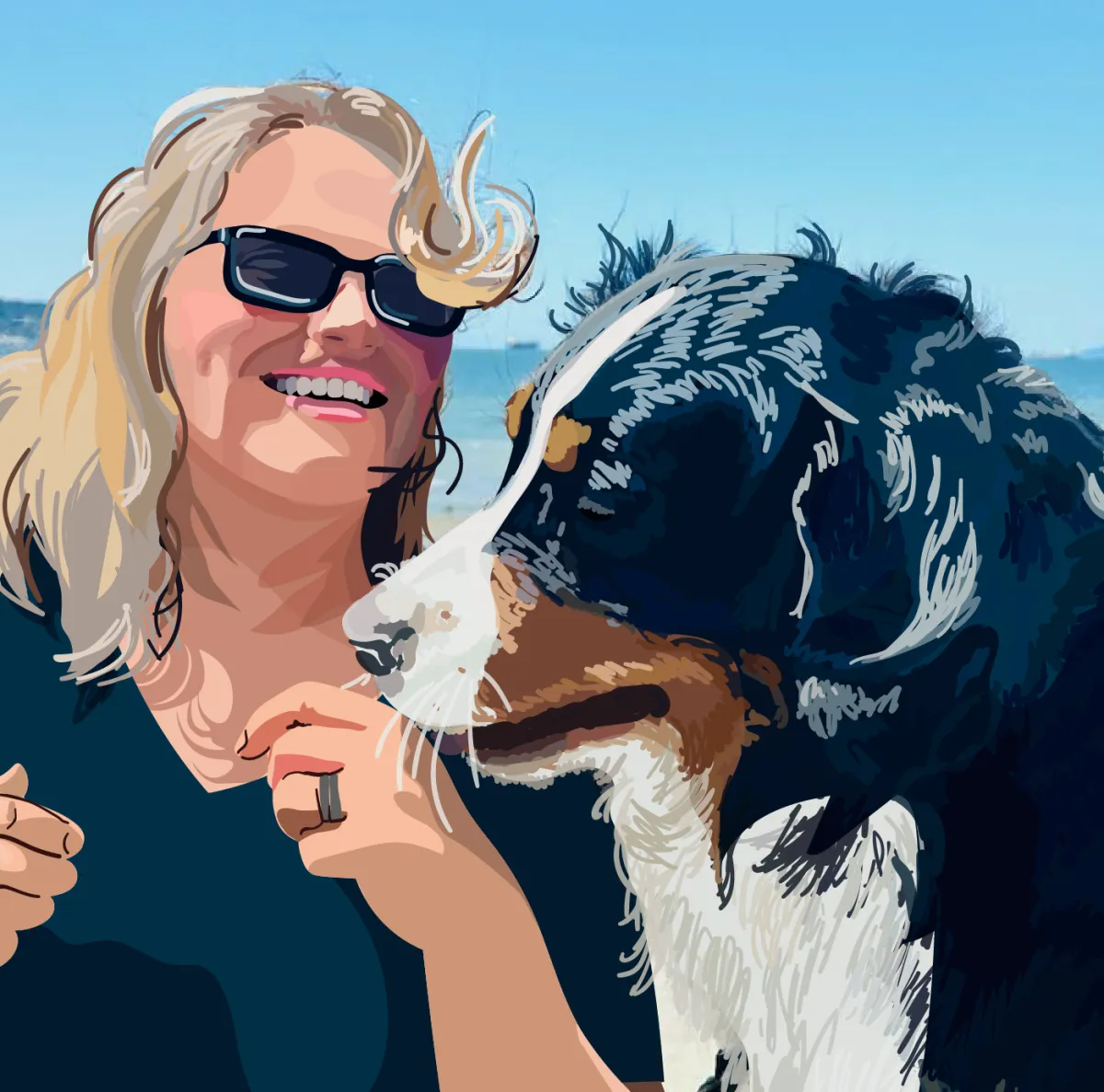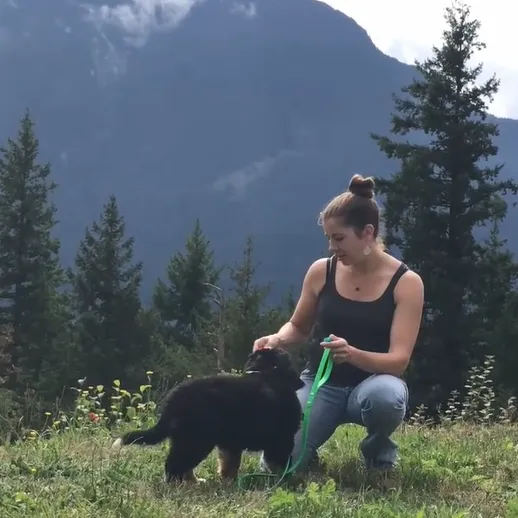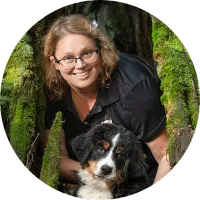

About Us
Since 2011, we’ve combined formal education in psychology, veterinary care, and canine cognition to provide exceptional dog training.
Dedicated to the humane and ethical treatment of our best friends, we rely on the latest research, while ensuring that our work is rooted in 15,000 years of human-dog connection.
Dogs and humans have evolved together for 20,000 years. They have found food for us, and protected our families and livestock. They have gone to war with us and acted as gentle playmates for our children. They have laid down their lives to save us.
Our lifestyles have changed a lot in the last century, but our need for dogs hasn't. A dog and their owner, when reunited, sync their heart rates within minutes. Just owning a dog decreases heart attack mortality by 30%.
We are designed to live with dogs, but we need to learn how to incorporate them into our chaotic modern lives.
We're here to help you and your dog learn how to live together in these modern times.
Forget sit and stay!
At Wag The Dog we can teach dogs to:
Find our phones and keys when we lose them.
Find our children when we lose them!
Put recycling in the blue bin.
Fetch their own leash for walks.
Close doors and cupboards.
Imitate our actions.
Communicate their needs and thoughts clearly.
Recognize fragile people like children and the elderly and be cautious around them.
Accompany us on outings and errands.
Trust us to return home to them when we go out.
Understand simple phrases and two step instructions.

Carol Millman (she/her)
- Lower Mainland
B.Sc, Psychology, Veterinary Technologist, Certified Pet Dog Trainer - Knowledge Assessed (2022), Certified Trick Dog Instructor
Carol lives in Port Coquitlam and works in the Lower Mainland. Her autism gives her a unique perspective which she brings to her work with both dogs and people. Her time working as a veterinary nurse culminated in becoming the Director of Medical Services at a holistic veterinary clinic.
In 2008, Carol was hired as an apprentice Advanced Instructor at Pacific Assistance Dogs Society (PADS). She trained and placed wheelchair assistance dogs, hearing dogs for the Deaf, and facility therapy dogs. She also ran puppy classes and assisted in the daily care of the dogs in training.
Carol is now the Director of Training at Heeling Assistants Canada, and still helps pet dogs through Wag The Dog.

- Currently On Leave -
Amelia Kellum (she/her) - Fraser Valley
B.Sc Canine Studies, Certified Professional Dog Trainer Knowledge/Skills Assessed (2022), Certified Trick Dog Instructor.
Amelia is a certified professional dog trainer with nearly two decades of experience training dogs - including hunting, acting, and assistance dogs such as hearing, therapy, guide, and mobility dogs.
Amelia has learned directly from Bonnie Bergin, pioneer of the disability assistance dog, and is also a graduate of the Ben Kersen and the Wonderdogs professional trainer's program.
She apprenticed at PADS as an instructor and has been training independently since 2010. She now lives in Hope with her family.
What can you achieve
with our help?
Come check out our blog!

Whether or Not You Adopt, Please...Please Shop.
It's a wonderful thing to adopt a dog and save a life. Proponents of rescuing dogs say, "don't shop - adopt!"
But adoption isn't for everyone, and whether or not you adopt a dog, you absolutely must shop for your own sake, for the sake of the dog you bring home, and for the sake of dogs everywhere in the world.
What Dog Is Right For You?
Dogs are not blank slates. Every dog is born with a certain set of inborn temperament traits, and while you can teach the dog new things and new behaviors, ultimately, the dog will be who they are.
Dogs have been domesticated for longer than any other animal except perhaps the horse. In that time we have created the widest variety within any species on planet earth.
The fact that a pug and a wolf are technically the same species is absolutely mind blowing don't you think?
But a pug and a wolf are - despite being close enough relatives that they could hypothetically make "Wugs" together - completely different animals. Living with a pug is absolutely nothing like living with a wolf. For one thing, the pug will require a LOT more health care, but will kill fewer squirrels.
So when you bring a dog home, be it pug, wolf, or any of the variations in between, it matters which one you pick.
How much do I want a dog who chases anything that moves?
How much do I want a dog who feels everything I feel?
How much do I want a dog who was bred to run all day?
Do I want a dog who needs a lot of attention?
Do I want a sensitive dog who is easily stimulated by touch, sound, and sight?
Do I want a serious dog or a mischief maker?
Do I want a dog who is independent or a dog who likes to be micromanaged?
Can I take care of a disabled dog?
It's Okay To Go To A Breeder
You're not saving a dog if you adopt a dog who doesn't fit your family.
Many adopted dogs end up back at the shelter when they flunk out with yet another family.
Not every family is equipped to deal with a dog who has a history of trauma, or who was born to a mother who had a traumatic life. Not every family is equipped to help a dog heal from PTSD, or to bring home a grab-bag puppy who could contain any combination of doggy traits.
THAT IS OKAY.
It is okay to say, "my family has very specific needs, and I won't be doing a dog a favour by bringing home someone we can't provide for."
But it's also important to remember that there are wonderful dogs in shelters who just got matched with the wrong family. And you could be the right one.
That's why you need to figure out what you're looking for.
Pure-Breds Are For Specific Types Of Jobs

If you want a dog to have a very specific set of personality and physical traits, then you need a purebred dog.
Dog breeds have been bred for hundreds of years to have a certain collection of physical and temperamental traits. If you have very specific requirements for a dog - like you need your dog to remain under your strata's 25 lb weight limit, or you want a dog who will have a non-shedding coat, or you want a dog to herd sheep all day in the pouring rain, then you are better off looking for a dog who was bred to fit those requirements.
But if you just happen to like the look and style of a particular breed, look up the job that breed was bred to do and ask yourself if you want that.
After all, you wouldn't buy a race car and complain that it makes a terrible ride-on lawn mower, would you?
...Then don't bring home a border collie and complain that it's obsessed with chasing things, or a beagle and complain that it won't heel. They were bred for a purpose, so they're going to be best for that purpose.
Purebreds are also far more likely to have health problems, so check your vet bill budget, too. Corgis and dachschunds have dwarfism and pugs have skull and spinal abnormalities. They will take extra care.
Mixed Breeds Are Grab Bags

Whenever you mix breeds, whether you pay thousands for a doodle or whether you adopt a Heinz 57 at the local shelter, you can get any type of result. Because you're no longer breeding like to like, nature can do its job and mix things up.
And that's great! It tends to lead to a healthier dog, for one thing. It also tends to smooth out some of the more extreme personality traits that purebreds can sometimes have bred into them. But if you want a very specific type of dog, you're taking a real gamble.
All Dogs Are Individuals
Purebred or not, every dog is a unique individual with a unique personality.
There a border collies who are couch potatoes, and there are pugs who think they're coonhounds.
Whether you pick an expensive puppy from a breeder or bring home one at the local shelter, get to know the actual dog before you commit to bringing them into your family. Have someone who lives with the dog, or puppy, to tell you if this puppy is active or lazy, dainty or clumsy, sociable or shy.
Never assume that you know what your dog will be like just because of their breed or genetic heritage. Some dogs just haven't read the manual.
The Most Ethical Choice Is The One That Prevents Dogs Who Need Rescuing.
How do dogs end up in shelters?
Some dogs are born on the street. The majority of the world's dogs are feral city dogs. Some rescues focus on taking these dogs off of the street and putting them into people's homes.
The dogs don't usually get a say in this.
If you have been born and raised on the streets of Mexico, you may not WANT to be shipped to the Pacific Northwest to live trapped in a house. Some dogs do - they are delighted to have a family and a home. Other dogs, I think, really miss the freedom of their old life.
In places like Vancouver, where there are no feral dog populations, dogs end up in shelters because their families didn't shop enough.
A family with small children decided to get a German Shepherd and then discovered that they couldn't handle that dogs' dramatic way of asking the kids not to pull his ears.
A single person who works decided to get a Viszla and discovered the dog did not like being left home alone for ten hours a day.
Someone with psychiatric struggles brought home a dog who needs a lot of emotional support, and they just can't give the dog that right now.
A couple living in a condo with a dog size limit brought home a dog who grew to be too large.
A family brought home a golden retriever who thought she was a husky and whose lifelong ambition was to run the Iditarod.
A dog with extreme sensory sensitivities was brought to live in a condo downtown and couldn't handle the noise and bustle, and the family had to accept that this dog needs a quieter home in a more rural area.
There's a heartbreaking story attached to each case, and in many cases the dogs were not bad, and neither were their owners. It's like a break-up - sometimes the match just wasn't right.
The best thing you can do for your family and for your dog is to bring home the right dog. And if you find that dog in the shelter - because there are truly fantastic dogs out there looking for the right home - then that's awesome.
But if you can't, that is also okay. It is better to get the dog you need and can live with than "rescue" a dog and break their heart.
Support Good Breeders To Save Dogs' Lives
I'll tell you one type of dog you will NEVER see in a shelter: A dog from a GOOD dog breeder.
A GOOD dog breeder is careful about where they place their puppies.
A GOOD dog breeder screen their dogs for health problems before they breed them, and screens them for temperament, too.
A GOOD dog breeder picks the right puppy for each buyer, to make sure the match is a good one.
A GOOD dog breeder will take one of their puppies back if the family can't keep them anymore.
A GOOD dog breeder keeps track of their puppies and stays in touch with the families they sell the dogs to.
A GOOD dog breeder makes people sign a contract promising to offer the dog back to them if for some reason the dog needs to be rehomed.
GOOD dog breeders are not contributing to the number of dogs in shelters. People who produce dogs responsibly and home them responsibly are providing what all puppies deserve - a loving home, a healthy genetic heritage, and a lifetime of being loved and cared for.
If you shop for a breeder like this... if you recommend breeders like this... then you are saving dogs.
Don't Supply The Shelters
If you are adopting a dog from a local shelter, then they are usually in that shelter for one of two reasons:
1. Someone let that dog be born, and didn't take the care to make sure it ended up in the right home.
2. Someone brought that dog from somewhere else, and didn't take the care to make sure it ended up in the right home.
If we are not in a position to rescue a dog, the best thing we can do is be sure we don't give money to someone who creates dogs who will someday need rescuing.
If you are looking for a dog, and you find a breeder who will let you pick out your own puppy based on looks, then that breeder is creating future rescue dogs.
If you are looking for a dog, and you see a "rescue" that is taking dogs out of one country, shipping them to very different environment, and delivering them directly into an adopter's home without meeting them, providing them with support and training, or matching dogs based on temperament - then that rescue is not rescuing - they are just moving dogs from point A to point B.
If you are looking for a dog and you find someone on craigslist whose dog had puppies, and they're selling the puppies to whoever shows up at their door - then that person is creating future rescue dogs.
Please don't ever give money to someone who is creating future rescue dogs. Please don't support people who treat dogs like commodities to be sold, instead of individuals to be cherished.
Please look for the breeder who shows that they have a lot of interest in you, in your situation, and who has opinions about which puppy would do best in your home.
Please look for a rescue who isn't just mass importing feral dogs and charging people adoption fees, but who are specifically selecting dogs who would do well in the Pacific North West, and who are careful about where they place their dogs.
Please look for the dog that is right for you - whose personality type matches yours, whose needs and lifestyle fit yours well. Because when you do that, you are saving THAT dog from the shelter... even if you're buying them from a breeder.

We work on land which was taken from the nations who had lived here for thousands of years. They are still here and they are still waiting patiently for us to stop being jerks about it.
© 2024 Copyright Wag The Dog Training
All Rights Reserved




